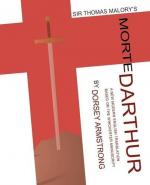|
This section contains 4,879 words (approx. 17 pages at 300 words per page) |

|
SOURCE: Mahoney, Dhira B. “Narrative Treatment of Name in Malory's Morte D'Arthur.” ELH 47, no. 4 (1980): 646-56.
In the following essay, Mahoney studies Malory's treatment of names and their significance in Le Morte Darthur.
The nature of any form of prose fiction is dictated by the author's attitude towards his readers or audience, and, as a corollary, towards his fictional material—his characters and the events which involve them. The medieval narrative tradition requires an author to treat his material in a way that is unfamiliar to readers of the novel, used as they are to either the omniscient, manipulative narrator of nineteenth-century fiction or the detached narrator of twentieth-century realism, “invisible, refined out of existence, paring his fingernails.”1 Still strongly connected to his roots in the oral tradition, the medieval author can never be invisible. As Scholes and Kellogg put it, “The traditional oral narrative consists rhetorically of a...
|
This section contains 4,879 words (approx. 17 pages at 300 words per page) |

|


